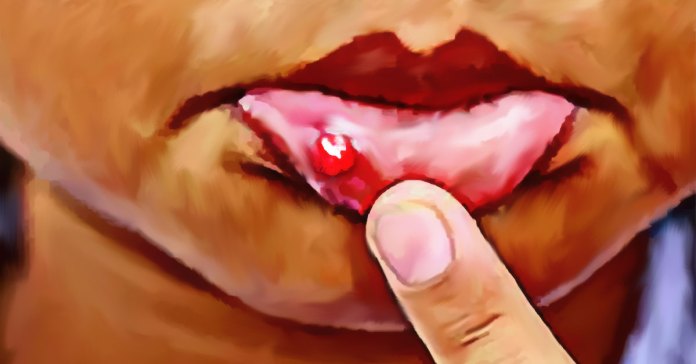Canker sores are a common condition where you get painful open sores in the mouth. These usually make their first appearance between 10 and 20 years of age; however, children as little as 2 may develop them. While some people get them only once or twice a year, some do almost continuously,1 and women are especially susceptible.2 Canker sores usually develop on the inside of the lips and cheeks, the roof of the mouth, gums, or tongue. These are white or yellow, surrounded by a red rim, and turn gray as they start to heal.3 The sores usually go away on their own in 1–3 weeks, and the pain resolves in around 7–10 days. But you may need to go to the doctor if the sore is getting worse or not resolving after 2 weeks or your child has additional symptoms like headache, diarrhea, fever, or a skin rash.4 Also see a doctor if your child gets these sores more than twice or thrice a year to determine if they are caused by a nutritional deficiency or allergy.5 Though antimicrobial mouthwashes and painkillers can help with canker sores, they might not be suitable for kids. So what can you do to help your little one through a canker sore?
1. Avoid Salty, Spicy, And Acidic Foods
Keep away from foods like nuts and potato chips which can be abrasive and irritate the tissues in the mouth. Also avoid spicy, acidic, and salty foods which may aggravate sores.6
2. Use A Soft Toothbrush
Make sure your child uses toothbrushes with soft bristles and brushes properly without damaging tissues in the mouth. It’s also a good idea to avoid using products which contain sodium lauryl sulfate.7
3. Rinse With Salt Water
Rinsing your mouth out with salt water can help. Salt has anti-inflammatory properties and it makes your mouth more alkaline, making it difficult for bacteria to survive. Make sure that your child spits out the salt water after swirling it around in their mouth for a few seconds, though.8
4. Use A Tea Compress
Tea contains tannin which has astringent properties that can soothe a canker sore. Apply a wet tea bag to the sore for relief.9
5. Have Yogurt Every Day
Having about 4 tablespoons of yogurt a day can help prevent canker sores since yogurt contains helpful bacteria that can counter the growth of harmful bacteria. Make sure you use yogurt that contains active cultures of the bacteria Lactobacillus acidophilus.10
Canker Sores Versus Cold Sores
Canker sores are often confused with cold sores or fever blisters which also tend to develop around the mouth area or on the lips. However, cold sores are small blisters caused by the herpes virus and not open sores. Infection by the herpes virus can give you either red blisters that may leak or blisters filled with a yellow fluid. Sometimes many blisters may join together into a large blister. Moreover, cold sores often start with a burning, itching, or tingling feeling around the mouth and are highly contagious unlike canker sores.11
How Are Canker Sores Caused?
We don’t yet clearly understand what causes canker sores and more than one cause may be responsible even in the same person. Some likely causes are:
- Allergy to bacteria commonly found in the mouth can trigger canker sores, though they don’t seem to be caused by bacteria or viruses.12 They may occur with viral infections. Canker sores could also develop as an allergic reaction to some foods.
- A malfunctioning immune system can cause it to attack normal cells in the tongue and mouth.13
- Genetic tendency may play a role since canker sores can run in families.14
- Injuries to your mouth, say, because you bit the inside of your mouth or brushed too hard which damaged the inner lining of your mouth, can cause canker sores.15
- Sodium lauryl sulfate, a chemical found in many mouthwashes and tooth pastes has been associated with canker sores and could delay the time it takes for a sore to heal.16
- Female sex hormones could have a part in causing canker sores. Many women develop sores at certain points in their menstrual cycle and also experience an improvement during pregnancy. Hormone therapy as also been used in certain cases to treat canker sores.17
- Nutritional deficiencies, especially the lack of iron, folic acid, or vitamin B12, can be responsible for the development of these sores.
- Stress can also trigger canker sores.18
References





